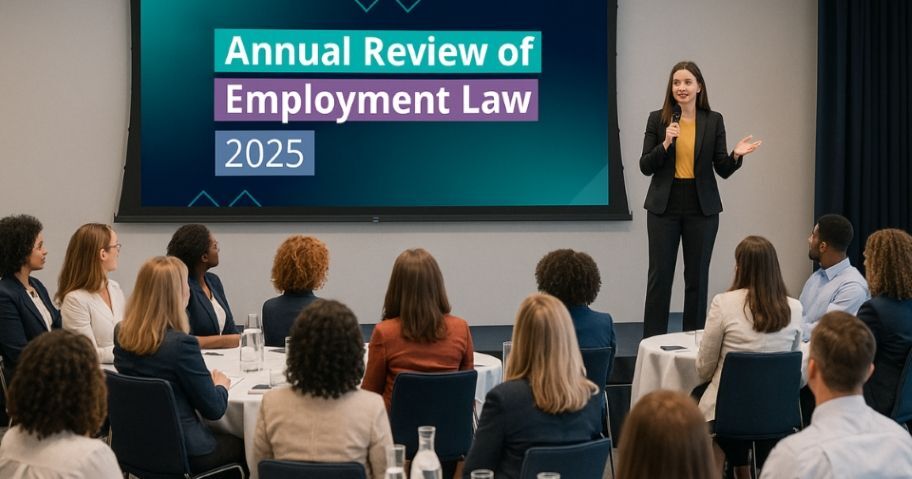
Caroline Reidy, Managing Director of the HR Suite and HR and Employment Law Expert. Caroline is a former member of the Low Pay Commission and is also an adjudicator in the Workplace Relations Commission.
Caroline is also an independent expert observer appointed by the European Parliament to the Board of Eurofound. Caroline is also on the Board of the Design and Craft Council Ireland and has been appointed to the Governing Body of Munster Technology University.
She also completed a Masters in Human Resources in the University of Limerick, she is CIPD accredited as well as being a trained mediator. Caroline had worked across various areas of HR for over 20 years in Kerry Group and in the retail and hospitality sector where she was the Operations and HR Director of the Garvey Group prior to setting up The HR Suite in 2009. She has also achieved a Diploma in Company Direction with Distinction with the Institute of Directors. She also has written 2 books, has done a TEDx and is a regular conference speaker and contributor to national media and is recognised a thought leader in the area of HR and employment law. Caroline also mentored female entrepreneurs on the Acorns Programme. Originally from Ballyheigue, Co. Kerry living in Dublin is very proud of her Kerry roots.
The HR Suite
With offices in Dublin, Cork and Kerry and a nationwide client base of SME's and multinationals, The HR Suite has over 600 clients throughout Ireland and employs a team of HR Advisors who offer clients expert HR advice, training, third party representation and other HR services.
The HR Suite has been acquired by NFP, an Aon Company, a leading global insurance broker. This expands the range of services on offer to their clients such as Health and Safety, Outplacement, Employee Benefits, and Pensions.
Amore Irish employers consider increasing office days, a question keeps coming up, how much time should people really spend in the workplace? For some leaders, the office is still where ideas flow best and culture comes alive. For others, flexibility has proven too valuable to lose. In this piece, we look at why some companies are calling people back, why others are leaning into hybrid, and how employers can strike a balance that keeps both performance and people in mind.
Why are some employers bringing people back?
For many leadership teams, the push for more office time is not about clock watching, it is about creating an environment where ideas spark naturally. Those quick conversations in the kitchen, the impromptu problem-solving sessions, and the chance for junior staff to learn by osmosis from more experienced colleagues are difficult to recreate on a screen. For some organisations, it is about reigniting collaboration and culture; for others, it is about holding on to flexibility to retain talent. The reality is that employers need to find a balance that works for both the business and the people in it.
Flexibility still matters
Flexibility still matters. In fact, it remains one of the most valued aspects of modern work. Research from CIPD Ireland shows it is consistently among the top priorities for candidates when considering a new role. Many employees say they can get more done at home when they need deep focus without the background noise of a busy office.
Offering flexible options also widens the talent pool, making it possible to attract skilled people who live outside the main cities or who have caring responsibilities. Cutting out long commutes can ease stress, reduce costs, and support environmental goals by lowering carbon emissions. For employers, it can be a powerful way to boost wellbeing and engagement while meeting business needs.
What employees are saying
In conversations across Irish workplaces, recurring themes are emerging. Commuting costs and time are now a bigger factor than before, especially for those who moved further afield during the pandemic. What used to be a short journey can now take up a significant part of the day and that’s before you account for fuel prices or train fares. Parents and carers also highlight the challenge of maintaining childcare or caring arrangements when office attendance requirements are fixed. For them, even small changes to schedules can impact carefully balanced routines.
From the employer’s side, there is often a clear operational reason for asking people in whether it’s for collaborative sessions, mentoring opportunities, client meetings or building team culture. The challenge is ensuring these in-office days are purposeful. For example, if employees make the trip in only to spend most of the day on virtual calls with colleagues elsewhere, it can undermine the intended benefits.
This is where clear communication becomes essential. Explaining the “why” behind in-office requirements and demonstrating the value to both the individual and the organisation, can help align expectations and reduce frustrations.
Real-world examples from Irish workplaces
- AIB has announced that from January 2026, hybrid-eligible staff must be in their base office at least three days a week with time in branches or hubs not counting. Their rationale? Strengthening collaboration and connection. The Financial Services Union publicly criticised AIB’s plan to require hybrid-eligible staff to work in their base office at least three days a week from January 2026, saying it failed to reflect modern working realities and ignored staff feedback. The FSU argued that the policy would disrupt work-life balance, increase commuting costs and risk losing talent, particularly among parents and carers. They have called on AIB to revisit the policy through meaningful consultation and to provide stronger flexibility provisions.
- Aerlytix, a Dublin-based aviation finance tech firm, takes a different tack offering part-week remote work plus a “work-from-abroad” allowance for two weeks a year. Staff engagement scores suggest it is hitting the right note.
Challenges on both sides
For employees used to remote-first routines, more office time can feel like a backward step particularly if commutes are long. It can also make recruitment trickier if top candidates prioritise flexibility.
On the flip side, fully remote models can make it harder to build culture, integrate new hires and keep communication consistent. Managers may need to be deliberate about ensuring remote staff get equal access to projects, promotions and mentoring.
The road ahead
The return-to-office debate isn’t about rewinding to 2019 it is about shaping a way of working that serves today’s realities. Employers who treat hybrid not as a compromise, but as a deliberate strategy, will have the edge in both retention and results. That means making office days purposeful, respecting the flexibility people value and keeping the conversation open.
For more information on the HR Suite:
Telephone: (066)7102887 (Head Office)
Visit https://thehrsuite.com


